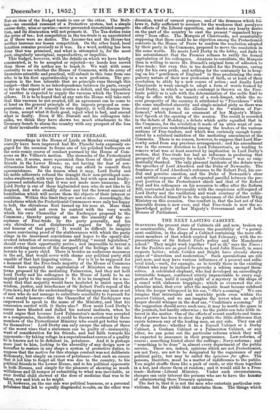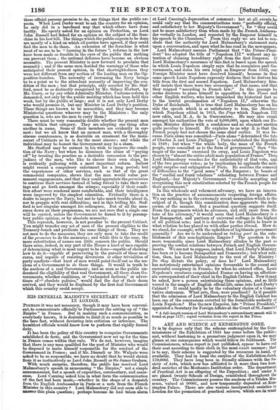THE NEXT LASTING CABINET.
SURVEYING the present state of Cabinets old and new, broken up or constructible, the Times foresees the possibility of "a perma- nent coalition, in the shape of a Cabinet containing the more effi- cient members of that which expired last February, with the re- presentatives of Sir Robert Peel's policy and the Manchester school." They might work together "not so ill," says the Times; for the Peelites are as good Liberals as Lord John Russell, in some respects better; while Cobden and Bright have already shown signs of "discretion' and moderation." Such speculations are rife just now, and may have various influences of a present and colla- teral kinds--suoh; for example, as to' terrify, those in the existing Cabinet whis may be inclined to provoke a schism amongst them- selves. A celebrated elephant, who had developed an exceedingly intractable temper, continued utterly impenetrable to every sug- gestion of fear, until it caught sight of a mystery in tlib shape of a camel with elaborate trappings ; which so overawed the ele- phantine mind, that ever after the majestic beast became subdued when the keeper whispered in his ear, "She's a-coming." We can imagine that intractable and unwieldy pride even within' the present Cabinet, and we can imagine the terror when an adroit keeper should whisper in the deaf ear, " Coalition's &coming." If the suggestion should serve such uses, it may be worth the space in the journals, but hardly otherwise ; for the public can take little in- terest in the matter. One of the effects of recent conflicts and trans-. fess of power has been to show the public the little difference that exists between any of the leading men, on any side. They can all of them profess : whether it be a Russell Cabinet or a Derby Cabinet, a Graham Cabinet or a Palmerston Cabinet, or any other, we can point out the particular reforms which they will be expected to announce in their programmes. Law-reforms, of course ; something hinted about the suffrage; Navy-reforms; and " something to be done" in almost every of the public service. There are, indeed, opinions which are not Protectionist, are not Tory, are not to be designated by the cognizance of any political party, but may be called the opinions for office. The persons, therefore, must be a matter of indifference to the public. You might shuffle them like a pack of cards, or stir them together in a hat, and choose them at random; and it would still be a Frees trade - Reform - Liberal Ministry. Under such circumstances, changes can only interest the persons who are to have the honsair of administering these Treasury opinions.
The fact is, that it is not the men who entertain particular con- victions, but the public that entertains them. The things which
these official persons.promise to do, are things that the public ex-, pests. When Lord Derby went to ask the country for auopinion,, he only did in a barefaced way that which others have done. tacitly. He openly poked for: an opinion on Protection, as Lord, John Russell had fished for an opinion on the subject of the frau-, chine in his lastbill. The things which the public expecte to be done are mostly of a kind on whioh allparties have agreed, if they could, find the men to do them. An extension of the franchise is what most of us see to be "looming in the.future "; reforms in the law have been made so feasible in the eyes of the public that nothing can prevent them.; the national defences have become an obvious necessity. The present Ministry is now forward to proclaim that necessity ; and if the same men derided the warnings of those who anticipated their present opinion, in that shortsightedness they were not different from any section of the leading men on the Op- position-benches. The necessity of increasing the Navy brings us to a point as to the attendant necessity of improving the con- dition of the men ; but that principle, ably asserted by Mr. Staf- ford, must be as distinctly recognized by Mr. Sidney Herbert, by Mr. -Corry, or by any other Admiralty Minister. Customs-reform is demanded, not only by the public meeting which has been held this week, but by the public at large- and it is not only Lord Derby who would promise it, but any Minister in Lord Derby's position. These things are known to be necessities, and they may become Ministerial questions whoever may be the Ministers : the only question is, who are the men to carry them ?
There must be very reasonable doubts• whether the present men eome within that category. They are adopting one thing after another in name. Some of their members are evidently in ear- nest: but we all know that an earnest man, with a thoroughly sincere countenance, is as desirable an ornament. for the insin- eerest of Cabinets as he is for the most sincere ; and while the individual may be honest the Government may be a sham.
Mr. Stafford may be earnest in his wish to improve the condi- tion of the Navy; but when he dismisses the abuse of "paying off" by treating the practice as a desirable concession to the pre- judices of the men, who like to choose their own ships, he is evidently paltering with a most important reform. Sailors might resent a compulsory enlistment for a long period; but the experiences of other services, such as that of the great commercial Companies, shows that the men would value per- manent engagements, and that they could appreciate thepermission to continue their services instead of being forced to take their sav- ings and go forth;amongst the crimps; especially if their condi- tion afloat were rendered more comfortable, and their intelligence were improved by the simplest education. Evidently there is a desire to improve the Navy, but not to take much trouble about it, nor to grapple with real difficulties; and in this trifling Mr. Staf- ford is not singular amongst his colleagues. But of all the mea- sures down on their programme, we are not sure that a single one will be carried, unless the Government be forced to it byperemp- tory public opinion, or by absolute smeessity. This reproach, however, is not peculiar to the present Cabinet. You might transfer any set of men of the present eligibles to the Treasury-bench and predicate the same things of them. They are not men to do the measures, they are only men to take the credit of the promises to do the measurog ; and while this is the case, the mere substitution of names can little conoern the publio. Should there arise, indeed, in any part of the House a knot of meneapable of determining what is most urgent to,be done—capable of showing how to do it—capable of persevering in the pursuit of these mea- sures, and capable of resisting diversions or other trivialities of party conflicts—that knot of men would point itself out as the nu- cleus of a Government, to do these things. It would in truth be the nucleus of a real Government ; and as soon as the public un- deratood the eligibility of that real Government, all these sham Go- vernments, whether coalitions, or "exhausted factions," or adver- tisers of -" obsolete policies," would. find the day of their doom arrived, and they would be displaced:by the first real Government which this country could accept.



























 Previous page
Previous page